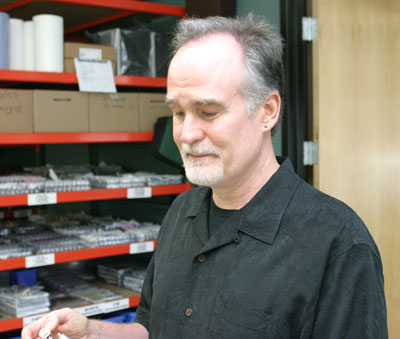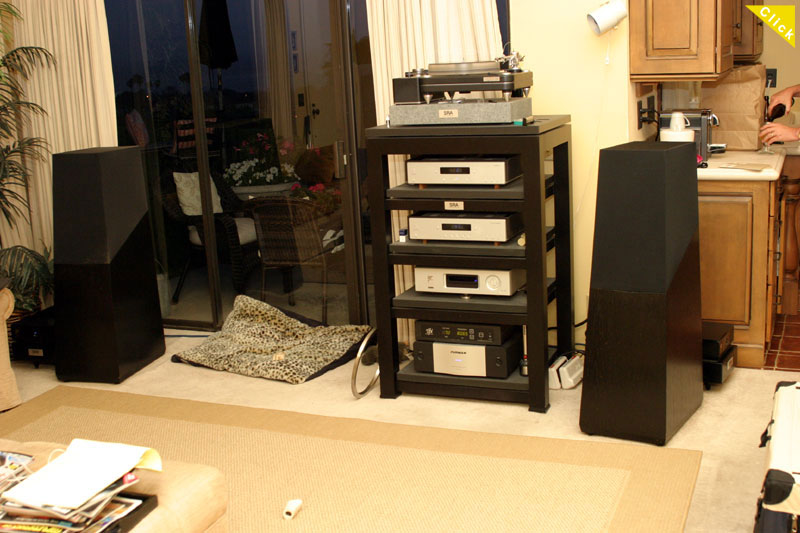Music Matters to Him
telephone repairman who was in my house a few weeks ago reminded me of something that's inevitable for audiophiles: experiencing the bewilderment of people who are not afflicted with the same passion for music and high-fidelity sound. After gawking at my audio system, he asked the eternal question, "How much does this stuff cost?" Without going into specifics (I do have some shred of social awareness) I told him that I could buy a very nice sports car for the money I have put into my audio system, after which he faked a case of weak knees. I'm sure he left thinking that he had undercharged me.
But there's a one-man equalizer, Joe Harley. As the vice president of AudioQuest, the well-known maker of audio cables at a wide array of prices, Joe is more in tune with the audio industry than any audiophile. He knows personally the people who design and manufacture the equipment, and he's intimately familiar with the products they create. As a music producer with decades of experience and hundreds of albums to his name, he's also accomplished in the business end of music recording. But it's when you visit Joe at home that you realize he's as centered as Buddha, at oneness with the two sides of the audiophile condition. He has a collection of LPs, CDs and SACDs that any music fan would envy and an audio system that does all that great music justice. On a hill overlooking the ocean... he setting of Joe's place is idyllic: San Clemente, California, on top of a hill from which you can see the sun glinting off the waves of the Pacific Ocean. At first glance, his listening area seems questionable. It's asymmetrical, the right side opening to his kitchen behind, a sitting area further right, and a wall packed with shelves that hold thousands of LPs and CDs. His audio system takes up the opposite side, the left speaker residing near the corner of the room and the right in nearly open space. Joe Harley's audio system. The left speaker is much closer to a boundary than the right, but you'd never know it when you hear music coming from the system. And this is no starter system. As I expected, Joe uses some of the best speakers and electronics available, everything fine-tuned, possessing the resolving power needed to reveal what's happening on the recordings he produces. The speakers are Vandersteen 5As, which are driven by a pair of Ayre MX-R mono amps. Given that Joe's listening area is also his living room, being able to tuck the smallish Ayre amps away is a virtue that larger amps simply wouldn't allow. Along the wall and between the speakers is the equipment rack -- the only Silent Running Audio Craz Reference isoRack on the planet in a fully ebonized finish. On top is the centerpiece: a VPI Super Scoutmaster with 10.5i tonearm. Joe has two armwands for Lyra Titan stereo and mono cartridges. He is the person who convinced me of the musical importance of purist 1.0 sound -- mono record and mono cartridge -- and I continue to be in his debt for this. When I visited, the phono stage was an Aesthetix Rhea Signature; it is now an Audio Research Reference Phono 2. Joe's preamp remains an Aesthetix Calypso Signature, although I suspect an Audio Research Reference 5 will be part of his system at some point in the near future. Joe spins digital on an Ayre C-5xeMP universal player, a product I know well, as I use one too. Cables are naturally from AudioQuest and all the company's best: William E. Low Signature interconnects, speaker cables, and power cords. These serious-looking cables use AudioQuest's DBS system, which, among other things, keeps them in broken-in sonic form even when they're not in use. With the lights turned off and the summer breeze drifting in, the atmosphere was bewitching, aided all the more by the music Joe chose. The playlist was dominated by analog and Music Matters Blue Note test pressings. I had no complaints. Starting with Dexter Gordon's Gettin' Around and Curtis Fuller's underappreciated The Opener, Joe worked his way to a cut that I had never heard, "Talkin' About J.C." from Grant Green's wondrous Talkin' About! Here, a trio of Green on guitar, Larry Young on Hammond organ and Elvin Jones on drums -- masters all -- channeled the creative spirit of John Coltrane (and the miracles of another J.C.) with such intensity that I was transfixed for its duration. Joe's listening couch could have levitated and I wouldn't have known. His system allowed us to hear deeply into the recordings, especially the way in which the music interacted with Rudy Van Gelder's Hackensack, NJ studio. I've heard the electronics, speakers and cables Joe uses at shows or in my system, and they never achieved this level of insight.
ventually the listening turned to talk about music and Joe's work with Music Matters, the label he founded with jazzologist Ron Rambach to release remastered versions of classic Blue Note recordings on 45rpm LPs. Those of us who have been following Music Matters know that 64 titles were initially announced. Over 20 have been released, with a dozen of these already sold out. Well, here's a tidbit I pried from Joe that will warm the hearts of those who have been buying these great LPs with near-religious fervor: After the initial 64 titles, Joe and Ron have 80 more planned. Eighty! At two releases each month, there could be new Music Matters double-LP sets available for another decade. "This is fun," Joe said in his understated way,
referring to his work with Music Matters and AudioQuest. But he could have meant the time
I spent listening to test pressings on his dialed-in audio system. The warm waters of the
Pacific have nothing on the soothing power of such music-centered hospitality. |

 This incident was also a
reminder of an important truth: If you're an audiophile, the music has to matter above
all. Without the music, the equipment doesn't matter one whit. Audiophiles everywhere will
nod in agreement with this, but some still lose perspective. To the repairman who asked
about my audio system, the symbol of everything that's wrong with audiophilia would be the
several-thousand-dollar phono cartridge I have or an especially expensive interconnect or
length of speaker cable. In reality, the symbol of audiophile wrong-headedness is the
person who has sunk six figures into speakers as big as refrigerators, amps as heavy as
anvils and all of the electronics and cables needed to produce sound from a paucity of CDs
or [gulp] a music server loaded with the latest downloadable high-resolution digital files
that may sound great but lack musical significance. People like this are not culled from
the imagination of people like me. They exist, and in far too great a number to make those
of us who love great music feel completely comfortable in a room full of self-professed
audiophiles.
This incident was also a
reminder of an important truth: If you're an audiophile, the music has to matter above
all. Without the music, the equipment doesn't matter one whit. Audiophiles everywhere will
nod in agreement with this, but some still lose perspective. To the repairman who asked
about my audio system, the symbol of everything that's wrong with audiophilia would be the
several-thousand-dollar phono cartridge I have or an especially expensive interconnect or
length of speaker cable. In reality, the symbol of audiophile wrong-headedness is the
person who has sunk six figures into speakers as big as refrigerators, amps as heavy as
anvils and all of the electronics and cables needed to produce sound from a paucity of CDs
or [gulp] a music server loaded with the latest downloadable high-resolution digital files
that may sound great but lack musical significance. People like this are not culled from
the imagination of people like me. They exist, and in far too great a number to make those
of us who love great music feel completely comfortable in a room full of self-professed
audiophiles.
 After a prolonged session
of listening to analog, evening turning into night, Joe switched to digital and a pair of
Blue Note XRCDs that he was just then finishing. These were special discs, as they came
unnervingly close to the sonics of the Music Matters test pressings in a few ways,
including their high resolution and the corresponding instrumental texture they displayed.
Joe then finished with more digital, more Hammond organ, and another recording he knew
well -- the Anthony Wilson Trio's Jack of Hearts, which he produced. "Theme
From Chinatown" is exactly that -- the theme from Roman Polanski's film noir about
bringing water to Southern California. This is straightahead jazz played by skilled
musicians, not a mere audiophile showpiece that holds the attention of those who listen to
sound, not music. It showed another facet of Joe's system -- its ability to display the
raw power of recordings with wide frequency response and forceful large-scale dynamics.
This was well-recorded music with soul, and Joe's system turned it into demo material.
After a prolonged session
of listening to analog, evening turning into night, Joe switched to digital and a pair of
Blue Note XRCDs that he was just then finishing. These were special discs, as they came
unnervingly close to the sonics of the Music Matters test pressings in a few ways,
including their high resolution and the corresponding instrumental texture they displayed.
Joe then finished with more digital, more Hammond organ, and another recording he knew
well -- the Anthony Wilson Trio's Jack of Hearts, which he produced. "Theme
From Chinatown" is exactly that -- the theme from Roman Polanski's film noir about
bringing water to Southern California. This is straightahead jazz played by skilled
musicians, not a mere audiophile showpiece that holds the attention of those who listen to
sound, not music. It showed another facet of Joe's system -- its ability to display the
raw power of recordings with wide frequency response and forceful large-scale dynamics.
This was well-recorded music with soul, and Joe's system turned it into demo material.